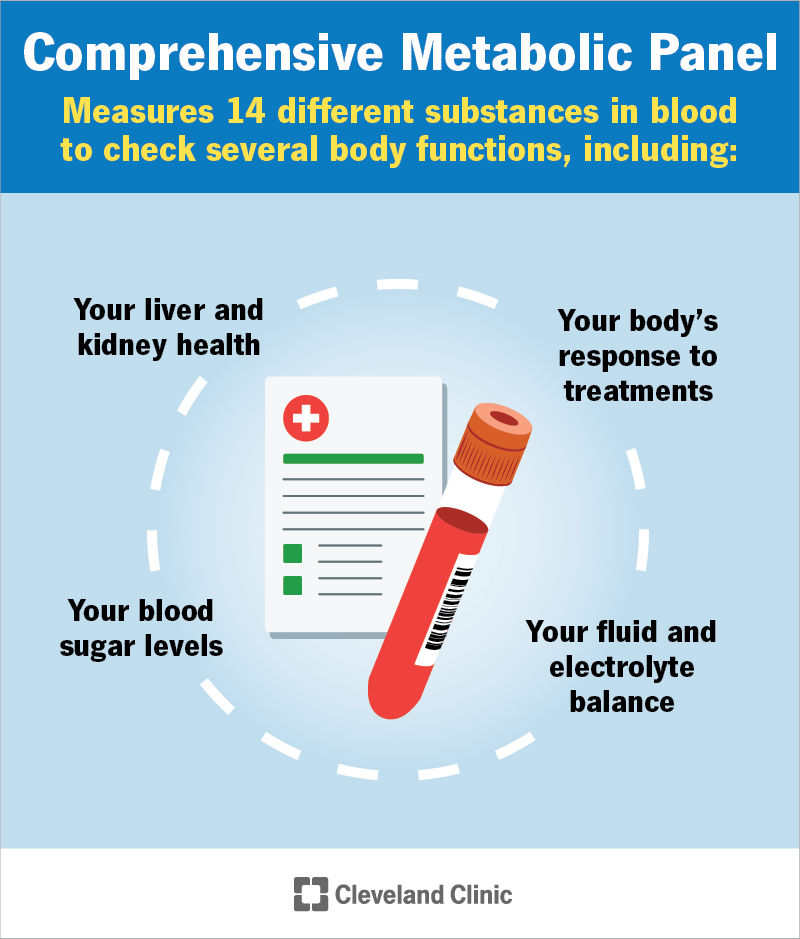A comprehensive metabolic panel (CMP) is a blood test that measures proteins, enzymes, electrolytes, minerals and other substances in your body. A healthcare provider can use the results to diagnose, screen for or monitor health conditions or side effects of medications. Providers often order a CMP as part of routine healthcare.
Advertisement
Cleveland Clinic is a non-profit academic medical center. Advertising on our site helps support our mission. We do not endorse non-Cleveland Clinic products or services. Policy

Image content: This image is available to view online.
View image online (https://my.clevelandclinic.org/-/scassets/images/org/health/articles/22058-comprehensive-metabolic-panel)
A comprehensive metabolic panel (CMP) is a blood test that measures 14 different substances — like proteins and electrolytes — in your blood. It’s a routine test that can give your healthcare provider a picture of your overall physical health. It can help diagnose, screen for or monitor certain health conditions.
Advertisement
Cleveland Clinic is a non-profit academic medical center. Advertising on our site helps support our mission. We do not endorse non-Cleveland Clinic products or services. Policy
CMP tests can measure or monitor:
The 14 substances measured in a CMP include:
These include enzymes and waste products that indicate how well your liver and kidneys are working, and minerals, sugars and other substances that your body needs to be in balance to stay healthy.
These CMP tests check how well your liver is working:
These CMP tests check how well your kidneys are working:
Advertisement
Electrolytes in your blood control nerve and muscle function. They also maintain the acid-base balance (pH balance) of your blood, maintain the fluid balance in your body and more. Electrolytes measured as part of a CMP include:
A CMP also measures your levels of glucose and calcium:
Your provider might order a CMP for:
A healthcare provider might order a CMP if:
For a CMP test, your healthcare provider collects a sample of your blood and sends it to a pathology lab for testing. The lab measures levels of proteins, enzymes, electrolytes, minerals and other substances in your blood.
Advertisement
Maybe. Sometimes, providers ask you to avoid eating or drinking (fast) for 10 to 12 hours before a CMP. It might be helpful to schedule your test first thing in the morning, so you can eat right afterward. Your healthcare provider will give you specific instructions when they order the test for you.
To get a blood sample for a CMP test, you’ll have a blood draw at your provider’s office or a lab. You’ll sit in a chair and a phlebotomist will:
The entire procedure usually takes about five to 10 minutes.
There’s usually very little risk involved in getting blood tests, which is why they’re so common. There’s always a slight risk of infection any time something pierces your skin. You may have slight tenderness or a bruise at the site of the blood draw. This usually clears up in a few days to a week.
Advertisement
Once your CMP results are back, your provider will share them with you, or they might appear in your electronic health record. The results may appear as a list or a table.
These might seem like a confusing list of numbers and abbreviations. But if you know what you’re looking at, it can make it easier to read. In general, comprehensive metabolic panel results usually provide:
In most cases, you should have your CMP test results within one to two business days, though it could take longer.
If any of the CMP results are out of the range given by the lab, it could indicate:
Advertisement
Keep in mind that if one of your CMP results is abnormal, it doesn't necessarily mean that you have a medical condition that’s causing it. Other factors, such as diet, certain medications and health conditions, can affect your test results.
If you have an abnormal result, your healthcare provider might order additional tests to confirm or rule out a specific diagnosis. If you have questions about your results, don’t be afraid to talk to your provider.
Contact your healthcare provider if you have any questions about a CMP test or its results.
Blood tests like a comprehensive metabolic panel (CMP) are a minimally invasive way for healthcare providers to learn more about how your body is working. It can give your provider clues about what could be causing certain symptoms, allow them to monitor your response to medications or give an early warning about illnesses before symptoms start.
While getting blood tests and waiting for the results can sometimes cause anxiety, having that information allows you and your provider to work together to make a plan for the future. Don’t hesitate to reach out to your provider with any concerns.

Sign up for our Health Essentials emails for expert guidance on nutrition, fitness, sleep, skin care and more.
Learn more about the Health Library and our editorial process.
Cleveland Clinic’s health articles are based on evidence-backed information and review by medical professionals to ensure accuracy, reliability and up-to-date clinical standards.
Cleveland Clinic’s health articles are based on evidence-backed information and review by medical professionals to ensure accuracy, reliability and up-to-date clinical standards.
Cleveland Clinic’s primary care providers offer lifelong medical care. From sinus infections and high blood pressure to preventive screening, we’re here for you.
